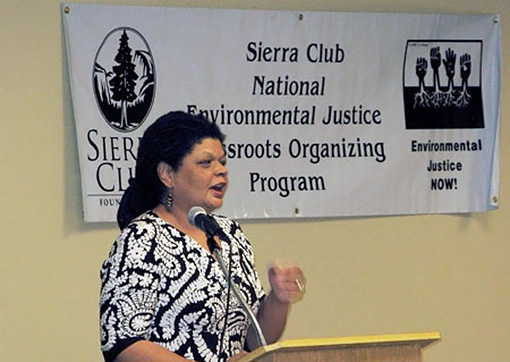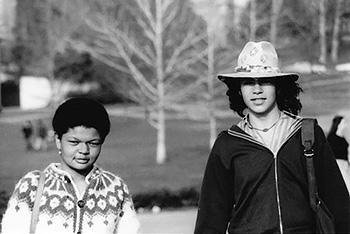
Leslie Fields '82 is director of the Sierra Club's Environmental Justice and Community Partnerships Program and teaches as an adjunct professor at the Howard University School of Law. Photo: Provided.
Alumna leads Sierra Club's environmental justice efforts
In the late 1990s, Leslie Fields '82 was a lawyer working for the Texas Legislative Council, drafting health and safety legislation and volunteering for the NAACP long before the term "environmental justice" was popular.

Fields during her freshman year at Cornell in the fall of 1978 with friend Wayne Salazar. Photo: Provided.
But when she visited an elementary school located next to a synthetic rubber plant, with toxic gases spewing and 18-wheelers traveling down a street where children were trying to cross, she knew she had to do something.
Dashing back to the law library at the University of Texas at Austin, she discovered there wasn't legislation on the books to fight against a situation like this.
"I was in tears," says Fields, a history and Africana studies major at Cornell who received her law degree from Georgetown University. "There was nothing in the law to help black and Latino kids who were going to schools next to nasty facilities. That's when the light bulb went on for me."
It was a good time for her to join the environmental justice movement, she says. People across the country were protesting hazardous waste dumps. The landmark 1987 report, "Toxic Wastes and Race in the United States," put out by the United Church of Christ's Commission for Racial Justice, tied environmental issues to race and socioeconomic status for perhaps the first time. Martin Luther King Jr. had been assassinated in Memphis in 1968 while supporting striking sanitation workers, and related movements such as farmworkers and indigenous peoples advocated for healthy environments in which to live and work.
"All of this was bubbling up at the same time and I got very interested in it," Fields says. "Because I didn't take environmental law courses at Georgetown, I started volunteering with the Sierra Club in Austin."
Today you'll still find Fields at the Sierra Club as director of its Environmental Justice and Community Partnerships Program, which works with grassroots and community organizations to address the damage, risk and discrimination facing many communities today. Examples of its involvement include supporting the sustainable rebuilding of post-Katrina New Orleans, protecting Navajo sites in Arizona and New Mexico, supporting communities fighting incinerator and gas pipelines in Puerto Rico and aiding communities in Detroit and Flint, Michigan.
Fields spends a chunk of her time working with government agencies on new rules under the federal Clean Air and Clean Water acts. The recent passage of the Clean Power Plan is "the jewel in the president's climate action plan," Fields says. The plan calls for reducing carbon pollution from power plants to 32 percent below 2005 levels by 2030.
But even with the passage of laws, enforcement is sometimes lacking.
"It can be very disheartening and heartbreaking," she says, "because we now have all of these environmental laws but they're not being enforced in communities of color and in poor communities."
Along with her Sierra Club position, Fields also teaches as an adjunct professor at the Howard University School of Law.
"I tell my students that if they don't love this, they're not going to make it," she says of environmental justice work. "There's a lot of intimidation, especially in rural areas. People's dogs get shot, they find dead animals in their mailboxes, they have death threats. You're going up against multinational organizations and they're not going to like it." In other countries, activists have been murdered for advocacy on behalf of their communities.
Still, Fields says the work is a calling and a focus that more and more people are realizing is a top priority for the United States, especially in light of climate change.
"What I love about environmental justice is that anyone can be involved," she says. "It's messy and it's complicated but it's a very exciting field."
Fields credits her parents, the Cornell in Washington program, her freshman crew team coach, great friends (such as College of Arts and Sciences Dean Gretchen Ritter '83) and several of her professors for supporting her to stay the course at Cornell, even when things got tough. Her brother Warren Fields '85 joined her at Cornell in the School of Hotel Administration.
Making the crew team her first year helped Fields focus on her academics, she says, because the athletic demands were steep.
"Our coach [Sharon Vaissiere] told us, 'if you don't do it in practice, you're not going to do it in the race, so take the practice seriously, learn your craft [and] study hard so that when the race comes, you're ready,'" Fields recalls.
But the rewards were great. "Rowing on Cayuga Lake in the morning when the mist was lifting was a transcendental experience," she says, "The women did not have a boathouse at the time -- we used the men's facilities. We rowed in leotards!"
Her favorite class was History 314 with Professor Walter LaFeber. "I still have that notebook," she says. "That was the best class I had at Cornell because it distilled what was going on in the present day and tied it to history. And he taught it like a tutorial; he was that interesting and charismatic."
She found other memorable courses in Africana studies (she remembers getting to class by cross-country skiing in the winter) with professors James Turner and Manning Marable. But it was her Cornell in Washington experience that cemented her government major.
"They were just starting it out, so we rented rooms in Dupont Circle," she says. "I had an internship at the National Organization for Women and just fell in love with D.C."
That continues today, as Fields looks forward to new initiatives and new projects.
"Everybody is getting it now and it's very exciting to see the environmental justice movement grow nationally and globally."